- Home
- E. E. Burke
Patrick's Charm (The Bride Train, #2)
Patrick's Charm (The Bride Train, #2) Read online
Patrick’s Charm
Book 2, The Bride Train
E.E. Burke
Copyright
Patrick’s Charm is a work of fiction. Names, characters, places and incidents are the product of the author’s imagination or are used fictitiously.
Copyright 2016 E.E. Burke.
All rights reserved, including the right to reproduce this book in whole or in part in any form.
Cover Design by Erin Dameron-Hill
Train photography by Matthew Malkeiwicz
Published by E.E. Burke
ISBN eBook 978-0-9969822-6-9
Table of Contents
Title Page
Copyright Page
Prologue
Chapter 1
Chapter 2
Chapter 3
Chapter 4
Chapter 5
Chapter 6
Chapter 7
Chapter 8
Chapter 9
Chapter 10
Chapter 11
Author’s Note
A Letter To My Readers
More From E.E. Burke
Follow E.E. Burke
About the Author
Prologue
Taken from an advertisement posted by the Missouri River, Fort Scott & Gulf Railroad in Eastern U.S. newspapers.
EVE, FIND YOUR ADAM IN THE GARDEN OF THE WORLD...
Single young ladies of good reputation desiring to emigrate west for the purpose of marriage may apply to the Young Ladies Immigration Society for free travel to southeastern Kansas, where hardworking settlers are eager to make their acquaintance and become steadfast husbands. Applicants must be free to wed, of marriageable age, preferably between the ages of 18 and 25, without deformities, debts or other encumbrances. Dance hall girls, circus performers and soiled doves need not apply. Must provide references.
From a letter dated April 8, 1870, written by Mrs. A. Langford, president of the Young Ladies Immigration Society and honorable member of the MRFS&G Railroad Board of Directors, to Mr. R. Hardt, newly hired land agent in Cherokee County, in regard to the success of the society’s matrimonial efforts:
The first bride train arrived in Girard, Kansas, on March 15. These young women, all of them respectable ladies, remained single for no more than a week. They have already had a calming influence on the unrest in Crawford County. We anticipate the same effect will be felt in Cherokee County subsequent to the delivery of more young women who are able to meet the men’s matrimonial needs.
However, you must be aware the arrival of the prospective brides did not stop the Land League from stirring up trouble. The insufferable rebels are worse than an infestation of rattlesnakes and used our rally as a distraction. Whilst some men bid for picnic baskets, others slithered off to burn railroad ties. Our loss was catastrophic. Beware, lest the same thing happen to you. The sooner matches are arranged the better.
Rest assured, the railroad’s board remains committed to this program, which will have its intended effect. Facilitating marriage isn’t solely a benefit to the railroad. It is for the good of the country. Lawlessness and savagery will not have the last word! The West will be settled, one bride at a time.
Chapter 1
May 23, 1870, Centralia Settlement, Cherokee County, Kansas
Lady Luck hadn’t been kind to Patrick O’Shea. In fact, she owed him for all the misery she’d dealt him. Yet, with every year that passed, her debt increased. One day, Luck would turn and smile on him and pay up. He just had to hold on until then.
Today, like other days, Patrick refused to dwell on his ill luck. Instead, he celebrated someone else’s good fortune. His friend, a former English lord, had recently gotten married, and to an Irish lass, no less, one of the twelve women shipped in by the railroad to become brides for local settlers. The couple had come into town to pick up supplies. While his wife visited friends, the husband did what most husbands would do under similar circumstances. He headed for a pub.
Patrick reached to the top shelf and took down a bottle. “A special occasion calls for the best Irish whiskey.” He poured two shots and slid one across the bar.
Constantine Valentine had arrived in Centralia a little over a month ago, dressed like a riverboat gambler and showing no interest in putting down roots on an unsettled stretch of land. He surprised everyone when, instead of selling the deed he won in a poker game, he started drilling holes in the ground, looking for coal. He found his black gold and planned to open a mine. Fickle luck favored the Englishman. Patrick wouldn’t hold it against him.
Valentine lifted his glass high. He towered over other men, in height as well as upbringing, yet he didn’t look down on them like most of his ilk. Another reason to like him. “Here’s to your health, O’Shea.”
“My health?” Patrick shifted his stance to relieve the constant ache in his hip and back, another trick of Fate, woven into the fabric of his cursed life. A tonic prescribed by the doctor made the pain bearable, but he would never regain the robust health he enjoyed before the war. He dragged his mind away from dismal reality to happier thoughts. “That’s not why I poured me best whiskey. We’ll drink to your new bride. She’s a keeper. If you hadn’t gotten ‘round to marrying your Irish Rose, I’d be tempted to take her off your hands.”
The Englishman cocked an eyebrow, for him an exaggerated gesture. “I’d advise you resist the temptation if you intend to remain in good health, Mr. O’Shea.”
Patrick chuckled. “Yeah, I heard you broke Hardt’s nose for being too familiar.”
“Not one of my prouder moments...” Valentine frowned as he gazed into his glass. “A misunderstanding.”
“Funny, Hardt said the same.”
Whatever the misunderstanding, it had taken the stuffy railroad agent down a peg or two. He was none the worse for it.
Valentine tossed back his drink. “Ah, that is the good stuff. I’ve noticed the barkeeps out here fill imported whiskey bottles with doctored up homebrew.”
Because men wanted cheap liquor, and imported wasn’t cheap.
“I only serve that to customers. Not friends.”
“Glad I’m considered among the latter.” Valentine set his glass on the bar and leaned forward in a manner that suggested he was about to impart a great secret. “A word of advice, my friend. If you’re in need of a wife, make the acquaintance of a barber. I have it on very good authority that women prefer smoothly shaven faces.”
Patrick stroked the thick beard he’d planned to shave, now that the weather was warming up. Maybe he ought to keep his whiskers if it would save him from the matrimonial disease afflicting other men in the area. “Don’t need a wife. I’m looking to hire dancing girls. Gents’ll turn out their pockets to watch gals kick up their heels. And I’ll pack the house if I get one that can sing pretty songs.”
“Seems unlikely you’ll find dance hall girls among the ladies who arrived. They’ve been promised marriage, and I daresay all twelve will be wed within a fortnight, based on how eagerly they’re being courted. There aren’t enough to go around.”
Patrick wiped out the empty glass. His generosity didn’t extend to two free drinks. “Decent women, you mean...” The town had its share of whores. But the few who might be considered pretty didn’t have a pleasant voice.
Loud curses erupted at one of the tables. Valentine glanced over, and his brow furrowed in a thoughtful frown. “Are you certain you want to add women to the mix?”
Patrick reached behind the bar for the rifle he kept handy. Arguments happened when whiskey was involved. Fights weren’t uncommon, either, but he couldn’t afford to have what little he owned destroyed. He nodded to a sign over the door. No fighting. No cheating. No s
pitting on the floor.
“I’ll add, keep your hands off the women, to the house rules.”
“You’ll have to enforce them.”
Patrick held up the rifle.
The Englishman’s expression remained doubtful. “You might consider hiring extra help.”
Patrick didn’t take the remark to be an insult to his manliness. He’d been built like a bull since the age of twelve and could handle himself in a fight despite his injuries. “I’ll worry about that when the time comes. First, I got to find the women.”
The angry voices faded into grumbles as the quarrelers settled down to their game of cards. Relieved, Patrick returned the gun to its place behind the bar. For the most part, his clientele were peaceful men: farmers and railroad workers, former Union soldiers like him, who came west for cheap land and the promise of riches. They worked at hard, often punishing, labor, and drank to socialize and alleviate their weariness and the frustration that came from dreams bumping up against hard realities. Some visited whores when they needed to slake a different kind of thirst.
Patrick didn’t aspire to run a brothel, not even a fancy one. He’d seen too many destitute young women lured into that degraded lifestyle, young women who reminded him of his sisters. He aimed to have the kind of establishment that offered a higher class of entertainment. Nothing too fancy, just a concert saloon that would make him enough money to live comfortably, so he wouldn’t have to scratch in the dirt like his father and his grandfather. His goals weren’t nearly as grand as when he first set foot in America. At the moment, however, his financial security seemed as far away as the green shores of Ireland.
“Thank you for the drink.” Valentine put a silver dollar on the bar.
Patrick pushed the shiny coin back to its owner, offended that his friend thought he’d be charged for the offered drink, or worse, overcharged. Might be the way they did things in England, but not here. “That one’s on me.”
Valentine regarded him with a puzzled frown. “You wouldn’t accept my thanks the other day when you vouched for me to Mr. Hardt. Now you won’t accept my money. What will you accept?”
Patrick stuck out his hand. “Your friendship.”
He received a firm handshake.
“You already have that.” Valentine collected his hat from where he’d set it on the bar. “I’d stay and visit, but I promised Rose I’d take her shopping.”
“Domesticated already? That didn’t take long.”
The Englishman secured his hat with a droll smile. “You should try it O’Shea. It’s not a bad state, matrimony.”
“I’ll have to take your word for it.” Patrick kept a smile pasted on to avoid sounding bitter. Having tried and failed at marriage, he was in no hurry to repeat the mistake.
After Valentine left, Patrick retrieved a cleaning cloth and wiped up a spill on the polished surface of the bar. With its ornate carvings and brass footrests, the fancy bar looked out of place on a floor covered in sawdust. Brought in by train all the way from New York, the hand-carved masterpiece had cost him two month’s rent. It was worth every hard-earned dollar. The fine piece of furniture made his dreams more substantial, less like wisps of smoke.
Patrick finished off the short pour he allowed himself, savoring the smoky burn of true Irish whiskey. One day, he’d invest in some oak barrels imported from Ireland and start making his own brand—another unrealized dream.
A shadow in the doorway caught his attention. The small figure outlined in the bright light from outside looked female...short, slight, too shapely for a girl. She sallied into the saloon with surprising boldness. Golden curls framed a face with youthful contours, but she possessed the poise of a mature woman. Patrick tried to guess her age, and couldn’t. Her yellow silk skirt bunched up in the back in what he assumed was a new style. Gold braid trimmed her black velvet jacket. No farmers’ wives he knew wore that get-up.
He didn’t wait for her to find whomever she sought, but went straight over to warn her she’d better wait outside. As he approached, she regarded him quizzically. Thick eyelashes a shade darker than her hair framed luminous brown eyes. He hadn’t seen many brown-eyed blondes, and it added to the mystery.
“I would like to speak with the owner,” she said in a pleasant tone, without a hint of embarrassment, even though her mere presence here could ruin her reputation.
Her delicacy and youthful beauty and something else, perhaps the innocence shining in her eyes, drew out a strong protective urge along with unexpected stirrings of desire.
Patrick didn't take the time to analyze the disturbing reaction. She had to leave. Now. "Miss, you can't be in here."
The young lady gave him the kind of smile a schoolteacher might bestow on a slow child. “The owner, Mr. O’Shea... Do you know where I might find him?”
For some reason, it irritated him that she hadn’t figured it out. “I’m Patrick O’Shea.”
The mystery woman’s smile vanished and she blinked. The news surprised her. Apparently, she expected someone more... Wealthy? Handsome? Accommodating?
In an instant, she recovered her poise and offered him her hand. “Yes, Mr. O'Shea, very nice to meet you.”
He grasped her fingers. The rush of heat signaling arousal surprised him so much he dropped her hand like he’d taken hold of a hot coal.
“I saw your advertisement on the side of the building,” she said in a blithe tone that indicated she hadn’t yet noticed how red his face was getting.
Considering the effect she had on him, he had to get rid of her. Just as soon as he worked out what she wanted. “My advertisement?”
Her lips twisted in a wry smile. “I supposed it was yours. Someone wrote, “Female entertainers wanted.”
“Oh, that...yeah, that’s mine. I wrote it...” He caught himself before he kept blabbing on like a fool. Maybe the medicine he took earlier combined with the whiskey had fogged his brain.
“Good.” She brightened up after he claimed responsibility. “Then I’m talking to the right person.”
“The right person?” He still didn’t know why she was here, although now he recognized her as one of the women who had arrived on the bride train earlier in the month. That didn’t explain why she would come to the saloon to talk to him about a sign he put up—unless she had an objection. That had to be it. She was one of those busybodies who liked to tell folks what they could and couldn’t do.
He crossed his arms over his chest and frowned down at her. “Are you here to tell me I shouldn’t be hiring women?”
Confusion flashed across her face, replaced by a look of amusement. “No, Mr. O'Shea...I'm here to apply for the job.”
***
Charm waited for the Irishman who owned the bar to speak again. His speechless reaction didn’t surprise her. Employers didn’t look at her and think female entertainer. More like, underage innocent.
Mr. O’Shea didn’t look his part, either. Rather than wearing nice woolen trousers and a colorful vest, beneath the bartender’s apron he had on denim and duck cloth. No neatly groomed mustache, either. His face sprouted an unkempt beard. He resembled his rough-looking clientele.
She cast a wary look around, beginning to question her spontaneous decision to inquire about the job. Like most saloons out west, the walls were adorned with the heads and horns of dead animals and amateur paintings of scantily clad women. The air smelled of stale beer, cigar smoke and a musky odor she associated with men who bathed infrequently.
The owner, at least, appeared to be clean.
She’d worked in worse places, and this job at least fit her skills, and it was better than an unwanted marriage, which would be her fate if she didn’t find some other way to support herself. Disregarding her misgivings, she met Mr. O’Shea’s bewildered gaze, and was struck by the unusual color of his eyes, an intriguing blend of blue and green. His best feature, perhaps. Though it was hard to tell with a beard covering half his face.
He still hadn’t spoken, which might mean he’d
already hired someone and wasn’t sure how to tell her. She sincerely hoped that wasn’t the case. “Is the position still available?”
Some emotion flickered in his eyes, which might’ve been interpreted as panic, except that didn’t make sense. “No.”
“No, it’s not available?”
“No, you’re not right for the job.”
His blunt rejection caught her off guard. Now what? Signing on as a bride had seemed a clever ruse, until she’d realized she was stuck in an uncivilized settlement with no other means of support. She had run from one danger straight into another. Would she be forced to go from saloon to saloon, begging for work, or worse, accept a stranger’s proposal?
The implications of her tenuous situation triggered an avalanche of emotion, and her eyes began to burn. Horrified, she blinked furiously. Real tears? She hadn’t cried real tears for ages, much less in front of a stranger who knew nothing—and didn’t care—about her predicament.
Alarm registered on his face. He raised his hands, the universal gesture of helplessness men used when confronted with a weeping woman. “Oh no...no miss, don’t cry. I didn’t mean to give offense, truly. This...this isn’t the sort of job you think it is.”
His meaning became clear. Heat flooded her face. Angered at being duped, she lost her patience. “Are you saying your sign is a thinly veiled notice for prostitutes? If so, I will insist you change it so as not to lure another innocent woman into your—”
“No!” Above the beard, his cheekbones reddened. He cast a worried look over his shoulder. The customers had turned away from their cards and conversations to watch them, some with curiosity, others with amusement.
Charm enjoyed being on stage but not being gawked at when she wasn’t performing. Ignoring the stares, she held the embarrassed owner’s gaze, her anger fading. As she had first suspected, she didn’t fit the image of what he thought a female entertainer should look like and that accounted for his remark about her not being right for the job. What a relief to hear he wasn’t running a brothel. “What type of entertainer are you looking for?”

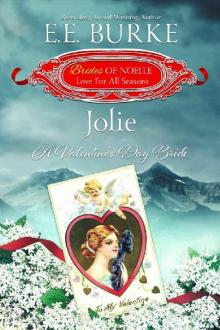 Jolie- A Valentine's Day Bride
Jolie- A Valentine's Day Bride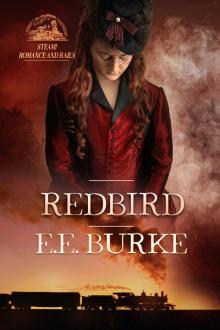 Redbird
Redbird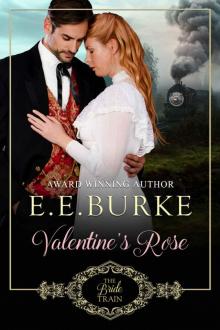 Valentine's Rose
Valentine's Rose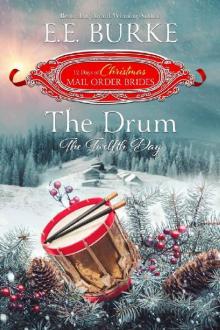 The Drum_The Twelfth Day
The Drum_The Twelfth Day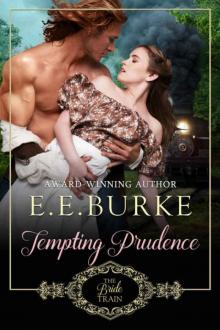 Tempting Prudence: The Bride Train
Tempting Prudence: The Bride Train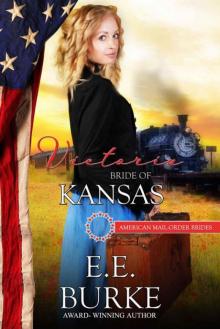 Victoria: Bride of Kansas (American Mail-Order Bride 34)
Victoria: Bride of Kansas (American Mail-Order Bride 34)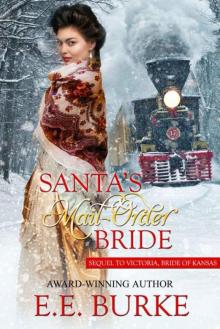 Santa's Mail-Order Bride
Santa's Mail-Order Bride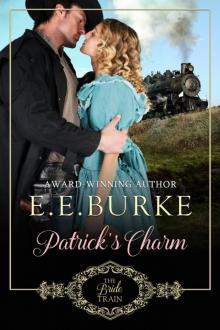 Patrick's Charm (The Bride Train, #2)
Patrick's Charm (The Bride Train, #2)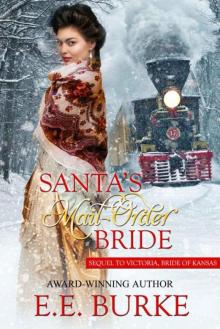 Santa's Mail-Order Bride (American Mail-Order Bride 34.5)
Santa's Mail-Order Bride (American Mail-Order Bride 34.5)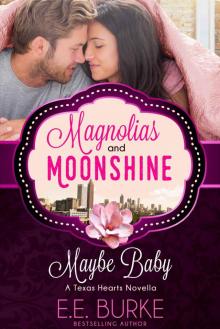 Maybe Baby
Maybe Baby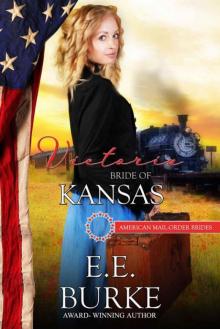 Victoria_Bride of Kansas
Victoria_Bride of Kansas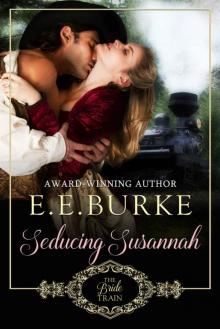 Seducing Susannah: The Bride Train
Seducing Susannah: The Bride Train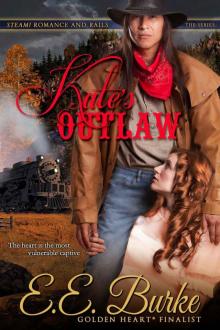 Kate's Outlaw (Steam! Romance and Rails)
Kate's Outlaw (Steam! Romance and Rails)